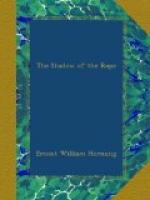THE END OF THEIR LIFE
“It is finished,” said the woman, speaking very quietly to herself. “Not another day, nor a night, if I can be ready before morning!”
She stood alone in her own room, with none to mark the white-hot pallor of the oval face, the scornful curve of quivering nostrils, the dry lustre of flashing eyes. But while she stood a heavy step went blustering down two flights of stairs, and double doors slammed upon the ground floor.
It was a little London house, with five floors from basement to attic, and a couple of rooms upon each, like most little houses in London; but this one had latterly been the scene of an equally undistinguished drama of real life, upon which the curtain was even now descending. Although a third was whispered by the world, the persons of this drama were really only two.
Rachel Minchin, before the disastrous step which gave her that surname, was a young Australian lady whose apparent attractions were only equalled by her absolute poverty; that is to say, she had been born at Heidelberg, near Melbourne, of English parents more gentle than practical, who soon left her to fight the world and the devil with no other armory than a good face, a fine nature, and the pride of any heiress. It is true that Rachel also had a voice; but there was never enough of it to augur an income. At twenty, therefore, she was already a governess in the wilds, where women are as scarce as water, but where the man for Rachel did not breathe. A few years later she earned a berth to England as companion to a lady; and her fate awaited her on board.
Mr. Minchin had reached his prime in the underworld, of which he also was a native, without touching affluence, until his fortieth year. Nevertheless, he was a travelled man, and no mere nomad of the bush. As a mining expert he had seen much life in South Africa as well as in Western Australia, but at last he was to see more in Europe as a gentleman of means. A wife had no place in his European scheme; a husband was the last thing Rachel wanted; but a long sea voyage, an uncongenial employ, and the persistent chivalry of a handsome, entertaining, self-confident man of the world, formed a combination as fatal to her inexperience as that of so much poverty, pride, and beauty proved to Alexander Minchin. They were married without ceremony on the very day that they arrived in England, where they had not an actual friend between them, nor a relative to whom either was personally known. In the beginning this mattered nothing; they had to see Europe and enjoy themselves; that they could do unaided; and the bride did it only the more thoroughly, in a sort of desperation, as she realized that the benefits of her marriage were to be wholly material after all.




